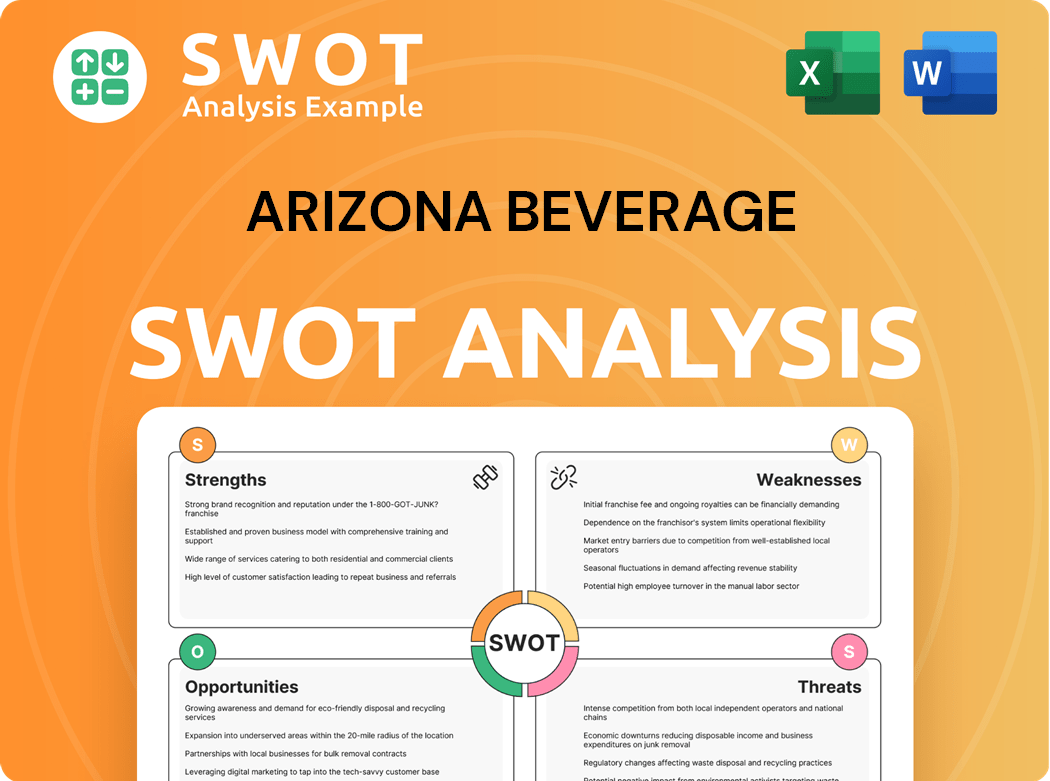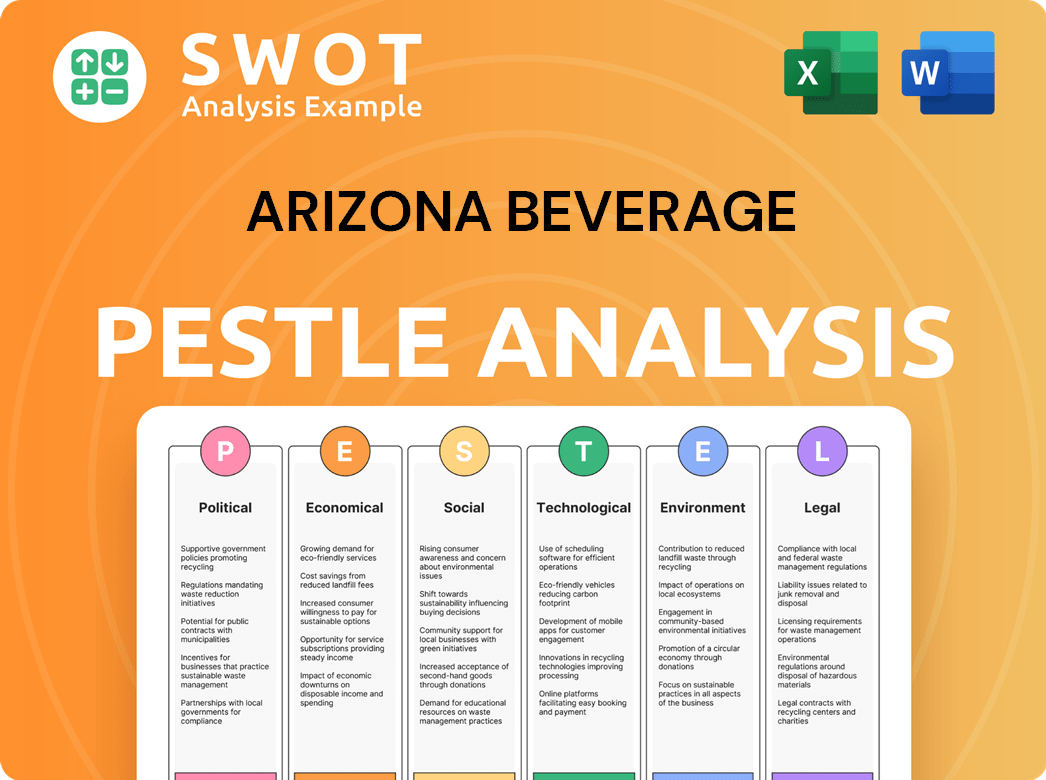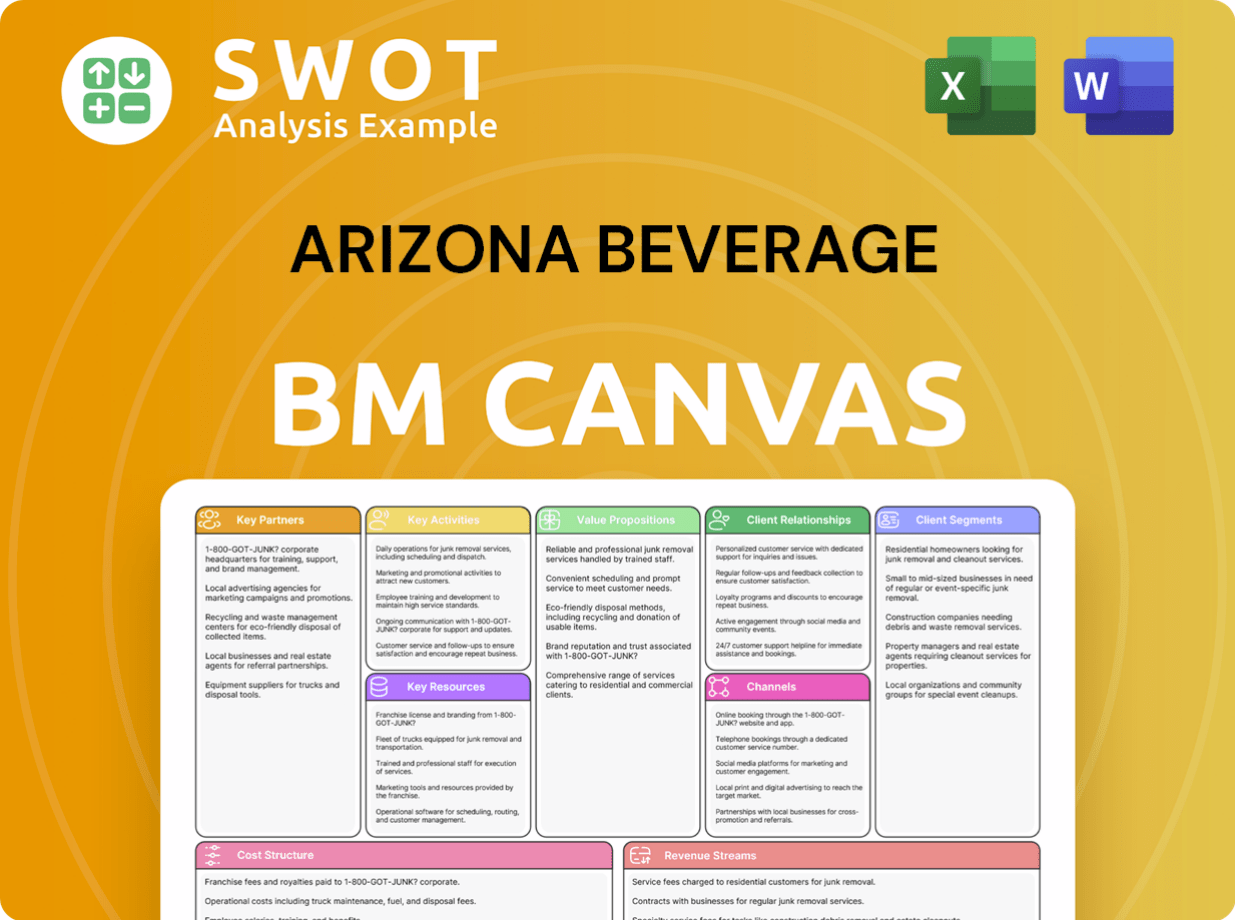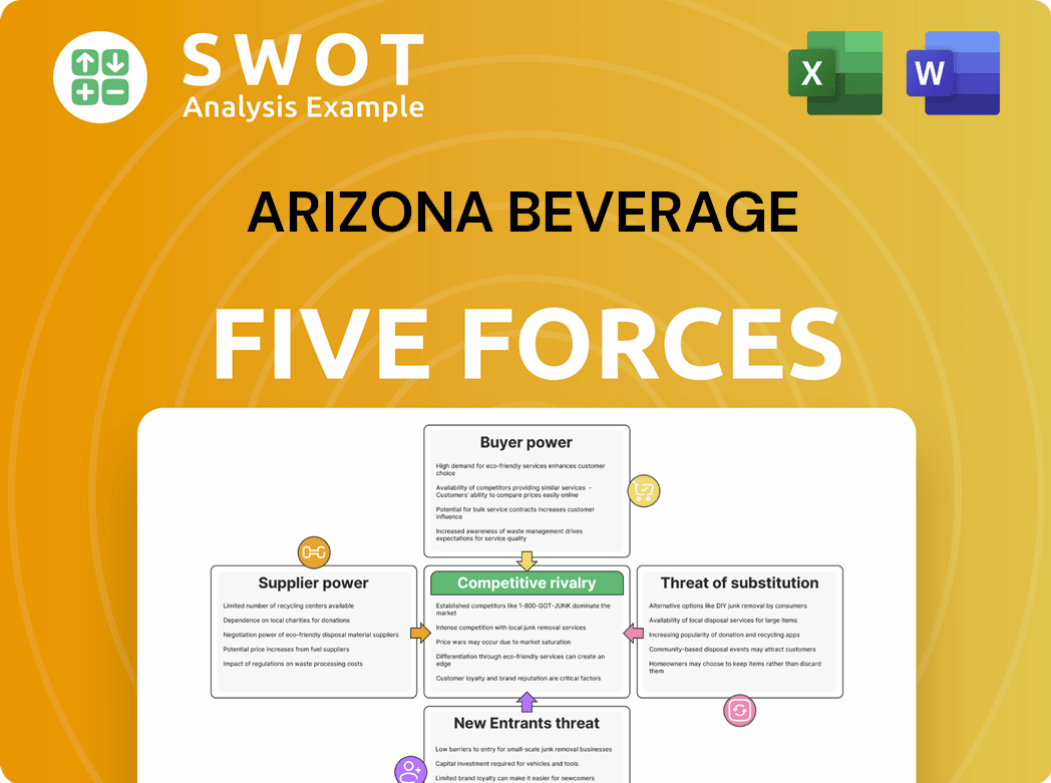Arizona Beverage Bundle
How Did AriZona Iced Tea Conquer the Beverage World?
The beverage industry is a battlefield of brands, but few have achieved the iconic status of Arizona Beverage Company. Remember the distinctive 23-ounce "Big Can" that revolutionized the iced tea market? Founded in 1992, AriZona's commitment to affordability and unique packaging quickly set it apart. This approach propelled them from a small New York startup to a global beverage empire.

From its humble beginnings, Arizona Beverage Company, or AriZona, has become a powerhouse in the ready-to-drink market, consistently ranking among the top tea brands. Its product line has expanded significantly beyond the original Arizona Iced Tea to include a variety of drinks and snacks, all maintaining the brand's signature style. This article will delve into the Arizona Beverage SWOT Analysis, exploring the key moments that shaped the company's remarkable journey, from its inception to its current position in the market, including its history, its products, and its future prospects.
What is the Arizona Beverage Founding Story?
The Arizona Beverage Company, known for its iconic AriZona Iced Tea, has a compelling founding story. It began with a vision to offer a high-quality, affordable iced tea option in a market that was ripe for disruption. The company's inception was driven by a keen understanding of consumer desires and a strategic approach to product development and pricing.
Founded on May 5, 1992, by Don Vultaggio and John Ferolito, the company quickly made its mark. Their initial focus was on providing a refreshing beverage at a competitive price point. This approach, coupled with a distinctive product, set the stage for their future success.
The founders, Don Vultaggio and John Ferolito, brought their beverage distribution experience to the table. This background was critical in identifying a gap in the market: the need for a large, affordable, and flavorful iced tea. The Arizona Beverage Company emerged to fill this void, starting with their now-famous Green Tea with Ginseng and Honey.
The company was established on May 5, 1992, by Don Vultaggio and John Ferolito.
- The founders had prior experience in the beverage distribution business.
- They identified a market opportunity for affordable, ready-to-drink iced tea.
- The first product was the Arizona Green Tea with Ginseng and Honey.
- The name 'Arizona' was chosen to evoke a sense of warmth and naturalness.
The founders' familiarity with the beverage market allowed them to pinpoint a significant opportunity. Existing iced tea options were often expensive and came in smaller sizes. The solution was simple: create a large, appealing can of iced tea and sell it at a competitive price, typically 99 cents. This pricing strategy was a key factor in their early success, making AriZona Iced Tea accessible to a wide audience. The company's initial funding came primarily from bootstrapping, utilizing their existing resources and reinvesting early profits. This approach allowed them to maintain control during the crucial establishment phase, setting the stage for future growth. To learn more about their strategic moves, explore the Growth Strategy of Arizona Beverage.
The cultural context of the early 1990s, with a growing consumer interest in healthier and more natural beverage options, further influenced the company's creation and its focus on tea. This alignment with consumer trends helped AriZona Iced Tea quickly gain popularity.
Arizona Beverage SWOT Analysis
- Complete SWOT Breakdown
- Fully Customizable
- Editable in Excel & Word
- Professional Formatting
- Investor-Ready Format

What Drove the Early Growth of Arizona Beverage?
The early growth of the Arizona Beverage Company, known for its AriZona products, was marked by a disruptive pricing strategy and distinctive packaging. Following the success of its iced teas, the company rapidly expanded its product line to include fruit drinks and other ready-to-drink beverages. This expansion was crucial to establishing a strong market presence. The company's initial focus was on efficient production and bottling to meet the growing consumer demand for its products.
The 99-cent 'Big Can' quickly became a consumer favorite, helping AriZona Iced Tea establish a strong presence in convenience stores and supermarkets, particularly in the Northeast. Initial team expansion was organic, scaling production and distribution to meet demand. The company's early success was fueled by its compelling value proposition, which resonated with consumers seeking affordable and flavorful beverages.
AriZona Beverage Company strategically entered new markets, leveraging existing distribution networks. They systematically expanded across the United States, gaining market share. While specific early acquisitions aren't widely publicized, the company's growth was driven by strong sales and disciplined financial management. This approach helped establish AriZona Iced Tea as a provider of high-quality, value-oriented beverages.
The first operational facilities for AriZona were located in Woodbury, New York, where the focus was on efficient production and bottling. Leadership remained consistent in the early years, with Vultaggio and Ferolito maintaining a hands-on approach. Market reception was overwhelmingly positive, with consumers embracing the affordable beverages. The company's growth efforts shaped its trajectory, firmly establishing the brand.
The competitive landscape, though populated by established brands, was ripe for disruption, and AriZona effectively capitalized on this. This strategic shift continues to define their business model. For more details, you can explore the Revenue Streams & Business Model of Arizona Beverage.
Arizona Beverage PESTLE Analysis
- Covers All 6 PESTLE Categories
- No Research Needed – Save Hours of Work
- Built by Experts, Trusted by Consultants
- Instant Download, Ready to Use
- 100% Editable, Fully Customizable

What are the key Milestones in Arizona Beverage history?
The Arizona Beverage Company has achieved numerous milestones throughout its history, solidifying its position in the beverage industry. The company's journey is marked by strategic decisions and innovative approaches that have shaped its success. These milestones highlight the company's growth and adaptability in a competitive market.
| Year | Milestone |
|---|---|
| Early 1990s | Introduction of the 23-ounce 'Big Can' for 99 cents, revolutionizing the ready-to-drink beverage market. |
| Ongoing | Securing various patents related to unique packaging designs and beverage formulations. |
| Ongoing | Establishing major partnerships with retailers for widespread product distribution. |
| Ongoing | Receiving recognition for marketing and product innovation, particularly for maintaining consistent price points. |
Innovation has been a cornerstone of Arizona Beverage Company's strategy, driving its market presence. The company's ability to create a recognizable brand identity through packaging and pricing has been pivotal. They have consistently adapted to market feedback by introducing new flavors and product categories, such as their expansion into sparkling waters and energy drinks.
The introduction of the 23-ounce can for 99 cents was a groundbreaking move, offering more product at an attractive price point. This strategy not only appealed to consumers but also set a new standard in the beverage industry, influencing competitors.
Arizona Beverage Company has expanded its product line beyond its core Arizona Iced Tea offerings. This includes venturing into sparkling waters and energy drinks to cater to evolving consumer preferences and market trends.
The company continuously introduces new flavors to keep up with consumer demand and market trends. This has helped maintain consumer interest and expand its product offerings.
Strategic partnerships with retailers have ensured widespread distribution, making AriZona products accessible across various locations. This has been crucial for market penetration and brand visibility.
The unique can designs have become a signature element of the AriZona brand, contributing to its recognition. These designs have helped the brand stand out in a crowded market.
AriZona has used marketing campaigns to keep the brand relevant and engaging. These campaigns have helped maintain consumer interest and brand loyalty.
Despite its successes, Arizona Beverage Company has faced several challenges. Maintaining the 99-cent price point has been a persistent issue, requiring efficient cost management. The company has also had to navigate intense competition from larger beverage corporations.
The commitment to the 99-cent price point has been a challenge, especially with rising ingredient and manufacturing costs. This has required a focus on supply chain efficiency and cost control.
The beverage market is highly competitive, with larger corporations posing significant challenges. AriZona has had to differentiate itself through branding, pricing, and product innovation.
Adapting to changing consumer preferences, such as the demand for healthier options, has been a continuous challenge. This has required the company to innovate and diversify its product offerings.
Efficient supply chain management has been crucial to maintaining profitability and the 99-cent price point. This includes sourcing ingredients and managing production costs effectively.
The company faces the challenges inherent in new product development and market acceptance. This includes launching new flavors and product lines that resonate with consumers.
Managing rapid growth and maintaining quality control across a vast product line has been a challenge. This requires effective operational strategies and quality assurance measures.
Arizona Beverage Business Model Canvas
- Complete 9-Block Business Model Canvas
- Effortlessly Communicate Your Business Strategy
- Investor-Ready BMC Format
- 100% Editable and Customizable
- Clear and Structured Layout

What is the Timeline of Key Events for Arizona Beverage?
The History of Arizona Beverage Company is marked by significant milestones, from its inception in 1992 to its ongoing expansion. The company, founded by Don Vultaggio and John Ferolito, quickly gained recognition with its iconic 23-ounce 'Big Can' iced tea, priced at 99 cents. Over the years, it diversified its product lines, solidified its distribution network, and maintained its commitment to affordability, even as it introduced new flavors and product categories.
| Year | Key Event |
|---|---|
| 1992 | Arizona Beverage Company was founded in Woodbury, New York, and introduced its first product, the 23-ounce 'Big Can' iced tea for 99 cents. |
| 1990s | The company rapidly expanded its product lines, including various iced teas, fruit drinks, and other ready-to-drink beverages. |
| Early 2000s | Arizona Beverage Company established a strong national distribution network across the United States. |
| 2015 | The company reportedly generated over $3 billion in annual revenue. |
| 2020 | Arizona Beverage Company maintained its 99-cent price point for many core products, even amidst economic changes. |
| 2022 | Plans were announced to expand into new international markets. |
| 2023 | New product lines, such as sparkling waters and energy drinks, were introduced to appeal to a broader consumer base. |
| 2024 | The company continued its focus on sustainable packaging initiatives and reducing its environmental footprint. |
Arizona Beverage Company is set to broaden its global presence, particularly in emerging markets. This strategic move is fueled by the growing demand for affordable and varied beverage options worldwide. The expansion will likely involve customized marketing strategies to appeal to local preferences, solidifying the brand's international footprint.
The company is investing in sustainable packaging solutions and eco-friendly production processes. This aligns with the rising consumer demand for environmentally responsible brands. By reducing its environmental footprint, Arizona Beverage Company aims to enhance its brand image and attract eco-conscious consumers.
Arizona Beverage Company is expected to continue innovating within its core beverage categories. This includes exploring new product categories that complement its current offerings. The focus will likely be on healthier and functional beverages, which are gaining popularity in the market.
The company plans to deepen its presence in existing markets through expanded distribution channels. This strategy involves increasing the availability of AriZona products in more retail locations. The goal is to maintain its competitive edge and increase market share within the ready-to-drink beverage sector.
Arizona Beverage Porter's Five Forces Analysis
- Covers All 5 Competitive Forces in Detail
- Structured for Consultants, Students, and Founders
- 100% Editable in Microsoft Word & Excel
- Instant Digital Download – Use Immediately
- Compatible with Mac & PC – Fully Unlocked

Related Blogs
- What is Competitive Landscape of Arizona Beverage Company?
- What is Growth Strategy and Future Prospects of Arizona Beverage Company?
- How Does Arizona Beverage Company Work?
- What is Sales and Marketing Strategy of Arizona Beverage Company?
- What is Brief History of Arizona Beverage Company?
- Who Owns Arizona Beverage Company?
- What is Customer Demographics and Target Market of Arizona Beverage Company?
Disclaimer
All information, articles, and product details provided on this website are for general informational and educational purposes only. We do not claim any ownership over, nor do we intend to infringe upon, any trademarks, copyrights, logos, brand names, or other intellectual property mentioned or depicted on this site. Such intellectual property remains the property of its respective owners, and any references here are made solely for identification or informational purposes, without implying any affiliation, endorsement, or partnership.
We make no representations or warranties, express or implied, regarding the accuracy, completeness, or suitability of any content or products presented. Nothing on this website should be construed as legal, tax, investment, financial, medical, or other professional advice. In addition, no part of this site—including articles or product references—constitutes a solicitation, recommendation, endorsement, advertisement, or offer to buy or sell any securities, franchises, or other financial instruments, particularly in jurisdictions where such activity would be unlawful.
All content is of a general nature and may not address the specific circumstances of any individual or entity. It is not a substitute for professional advice or services. Any actions you take based on the information provided here are strictly at your own risk. You accept full responsibility for any decisions or outcomes arising from your use of this website and agree to release us from any liability in connection with your use of, or reliance upon, the content or products found herein.